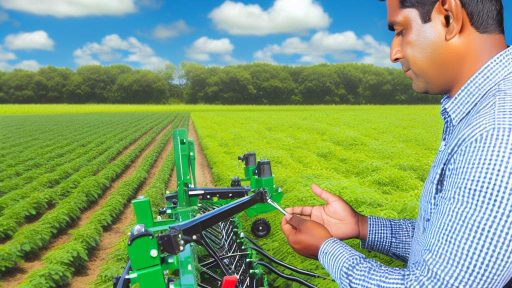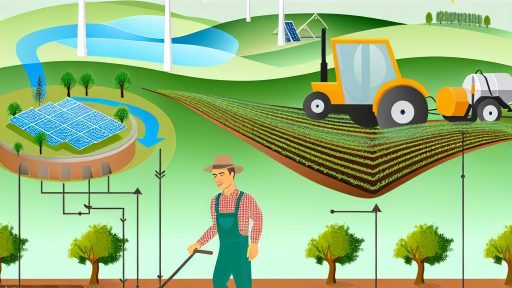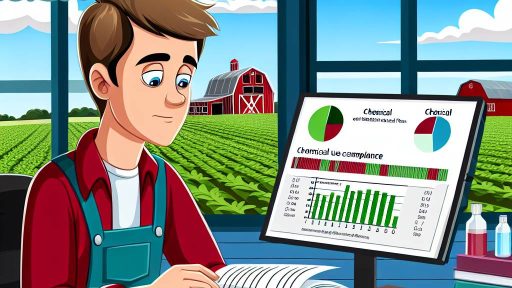Introduction to Agricultural Insurance and Its Importance in Farming
Agricultural insurance serves as a vital tool for farmers.
It helps manage the risks associated with farming.
Many farmers face unpredictable challenges every season.
Weather events, pests, and diseases threaten crop yields.
These factors can significantly impact farm profitability.
Consequently, agricultural insurance offers a safety net.
This protection ensures farmers can recover from losses.
Various types of agricultural insurance exist in the market.
Crop insurance is the most well-known option.
It covers losses from specific risks like drought or flooding.
Additionally, livestock insurance protects against animal loss.
This coverage helps maintain a stable income for farmers.
Moreover, it promotes long-term investment in agricultural practices.
Farmers can plan their business operations more confidently.
By minimizing risk, they can focus on improving their methods.
Transform Your Agribusiness
Unlock your farm's potential with expert advice tailored to your needs. Get actionable steps that drive real results.
Get StartedInsurance also encourages farmers to adopt innovative techniques.
New practices often come with inherent risks.
However, with insurance, farmers are more willing to experiment.
Thus, agricultural insurance fosters resilience in the farming sector.
It is a crucial component of effective risk management.
Farmers who invest in insurance are better equipped for success.
Types of Agricultural Insurance Products Available
Crop Insurance
Crop insurance protects farmers against crop loss due to natural disasters.
It provides financial assurance during unanticipated events like droughts or floods.
Farmers can choose between multiple policies based on their specific needs.
Such policies can cover loss due to pests, diseases, or adverse weather conditions.
Additionally, crop insurance can enhance credit eligibility for farmers.
Livestock Insurance
Livestock insurance safeguards farmers’ investments in their animals.
This coverage protects against loss from disease, accidents, or theft.
Various plans are available, catering to different types of livestock.
Farmers can select policies that fit their herd structure, like beef or dairy cattle.
This insurance can also ensure continuity of income for livestock producers.
Revenue Insurance
Revenue insurance focuses on protecting farm income rather than just crops.
This type of insurance guards against revenue loss due to market fluctuations.
Farmers receive compensation based on yields and market prices.
Moreover, it encourages proactive planning for future seasons.
This approach helps farmers maintain financial stability throughout their operation.
Farm Property Insurance
Farm property insurance covers physical assets such as buildings and equipment.
This protects farmers from losses due to theft or damage from disasters.
Policies can also include coverage for machinery breakdowns.
Showcase Your Farming Business
Publish your professional farming services profile on our blog for a one-time fee of $200 and reach a dedicated audience of farmers and agribusiness owners.
Publish Your ProfileA comprehensive plan enhances overall farm security and stability.
Farmers can tailor their coverage to encompass specific property needs.
Specialty Insurance
Specialty insurance includes niche products for unique situations and crops.
This may cover organic crops or specific high-value commodities.
Farmers can find tailored solutions based on individual farming practices.
Such policies often consider local risks and market dynamics.
Investing in specialty insurance can provide vital support to farmers diversifying their products.
Assessing Risks in Farming
Understanding the Need for Insurance
Farming comes with inherent risks that can impact profitability.
Natural disasters, pests, and market fluctuations pose significant threats.
Insurance provides a safety net against these unpredictable factors.
Farmers can face crop loss due to droughts or floods, leading to financial strain.
Thus, agricultural insurance becomes essential for risk management.
Especially tailored policies can cover various farming activities.
This coverage can range from crop insurance to liability insurance.
Cultivating awareness about these options is crucial for success.
Types of Agricultural Insurance
Farmers can choose from several types of agricultural insurance.
- Crop insurance mitigates losses from natural disasters.
- Livestock insurance protects against animal health issues.
- Revenue insurance offers coverage against fluctuating prices.
Each type addresses specific risks associated with farming operations.
Understanding each option can help farmers make informed decisions.
Benefits of Agricultural Insurance
Investing in agricultural insurance offers numerous benefits.
Firstly, it enhances financial stability in times of crisis.
Additionally, it allows for sustainable business growth.
Farmers can secure loans or attract investors with insurance coverage.
Moreover, it encourages farm innovation without fear of loss.
Finally, having insurance fosters community resilience among farmers.
Choosing the Right Insurance Policy
Selecting the appropriate insurance policy requires careful consideration.
Farmers should assess their specific needs and risks.
Consulting with insurance agents provides valuable insights.
Additionally, reviewing policy terms and premiums is essential.
Farmers must evaluate coverage limits and exclusions thoroughly.
Finally, staying informed about changes in the insurance market can be beneficial.
Gain More Insights: How Farmers Can Benefit from Solar Energy Incentives
How Agricultural Insurance Can Help Stabilize Farm Income
Understanding Agricultural Insurance
Agricultural insurance provides financial protection for farmers against unexpected losses.
It covers various risks, including crop failure and livestock loss.
In essence, it acts as a safety net during challenging times.
Benefits of Agricultural Insurance
This type of insurance helps stabilize farm income during adverse events.
Farmers can reduce their financial uncertainty through comprehensive coverage.
Moreover, insurance allows farmers to plan for future investments confidently.
Types of Coverage
There are different types of agricultural insurance available.
- Crop insurance protects against losses due to natural disasters.
- Livestock insurance covers loss due to disease or accidents.
- Revenue insurance helps safeguard against price fluctuations in the market.
Financial Planning and Sustainability
Access to agricultural insurance encourages better financial planning.
Farmers can allocate resources more effectively when they feel secure.
Showcase Your Farming Business
Publish your professional farming services profile on our blog for a one-time fee of $200 and reach a dedicated audience of farmers and agribusiness owners.
Publish Your ProfileThis leads to sustainable farming practices and long-term benefits.
Case Studies of Successful Implementation
Many farmers have achieved greater income stability through insurance.
For instance, Sara Thompson, a corn farmer, benefited significantly from crop insurance.
During a drought, her policy compensated for significant losses.
This financial support enabled her to recover and plan for future planting seasons.
How to Choose the Right Policy
Selecting the appropriate agricultural insurance policy requires careful consideration.
Farmers should assess their specific needs and risks before purchasing.
Additionally, consulting with an experienced insurance agent can provide valuable insights.
Points to Consider
Ultimately, agricultural insurance plays a vital role in the farming industry.
It stabilizes income and promotes confidence amongst farmers.
By securing their investments, farmers can focus on productivity and sustainability.
Delve into the Subject: A Comprehensive Guide to Animal Welfare Regulations for Farmers
Strategies for Choosing the Right Insurance Policy for Your Farm
Assessing Your Farm’s Unique Needs
Understanding your farm’s specific requirements is essential.
Each farm faces different risks and challenges.
Evaluate crops, livestock, and equipment involved in your operations.
Consider environmental factors that could affect your yield.
Your geographical location plays a critical role in risk assessment.
Researching Available Insurance Options
Start by exploring various agricultural insurance providers.
Compare policies from both regional and national companies.
Review each option’s coverage types and exclusions carefully.
Look for providers with a solid reputation in the industry.
Recommendations from fellow farmers can provide valuable insights.
Understanding Coverage Types
Familiarize yourself with the different types of coverage available.
Crop insurance protects against yield loss due to specific risks.
Livestock insurance covers losses caused by disease or natural disasters.
Equipment insurance safeguards your machinery from damage or theft.
Consider whether you need comprehensive or specialized policies.
Evaluating Costs and Benefits
Analyze the cost of premiums against potential benefits.
Ensure that the coverage aligns with your budgetary constraints.
Balance the price of insurance with the level of protection offered.
Sometimes, high premiums result in extensive coverage benefits.
Consult with a financial advisor to explore affordability.
Consulting with Insurance Agents
Engage with knowledgeable insurance agents to clarify details.
They can help assess your unique situation and guide your choice.
Ask questions about policy specifics and claim processes.
Experienced agents provide insights into what works best for farms.
Utilize their expertise to make informed decisions.
Reviewing Policy Terms Regularly
Once you select a policy, review its terms annually.
Your farm’s needs may evolve over time, impacting coverage requirements.
Stay informed about changes in agricultural laws or market conditions.
Showcase Your Farming Business
Publish your professional farming services profile on our blog for a one-time fee of $200 and reach a dedicated audience of farmers and agribusiness owners.
Publish Your ProfileAdjust your insurance coverage as necessary to stay protected.
Regular assessments ensure you are never underinsured.
See Related Content: Integrating Conservation Programs Into Farm Management
Case Studies: Successful Implementation of Agricultural Insurance
Introduction to Agricultural Insurance
Agricultural insurance protects farmers against unexpected losses.
This coverage helps stabilize income during uncertain conditions.
Farmers can focus on production knowing they have financial safety nets.
Case Study: Green Meadows Farm
Green Meadows Farm implemented crop insurance in 2021.
Unexpected drought severely impacted local yields that summer.
Due to their insurance policy, the farm received timely compensation.
This financial support allowed them to invest in irrigation solutions.
In following seasons, yields improved significantly due to these upgrades.
Case Study: Sunny Ridge Orchards
Sunny Ridge Orchards faced a hailstorm that damaged their harvest.
They had chosen comprehensive hail insurance before the season.
This protection enabled them to recover losses quickly.
With the money received, they replanted damaged trees immediately.
This proactive approach ensured minimal downtime for production.
Case Study: Farmland Cooperative
Farmland Cooperative offers its members a unique insurance program.
This program combines crop and livestock insurance options.
In 2020, vast flooding affected many members’ farms.
Thanks to their cooperative insurance, farmers shared pooled resources.
The cooperative quickly responded with emergency funds to members.
This collaboration fostered community resilience and recovery.
Benefits of Agricultural Insurance
These case studies highlight the importance of agricultural insurance.
Farmers gain peace of mind in planning their production strategies.
Moreover, insurance fosters innovation within farming practices.
By mitigating risks, farmers can focus on growth and sustainability.
Ultimately, these practices lead to enhanced farm profitability.
See Related Content: Implementing Buffer Zones For Chemical Applications

Common Misconceptions About Agricultural Insurance
Myth: Agricultural Insurance is Only for Large Farms
Many believe only large farms can benefit from agricultural insurance.
In reality, small and medium-sized farms can gain significantly.
Insurance can help manage risks regardless of farm size.
Myth: Agricultural Insurance is Too Expensive
Some farmers think agricultural insurance costs too much.
However, these costs are often outweighed by potential savings.
Insurance can protect against devastating losses in poor seasons.
Myth: All Agricultural Insurance Policies are the Same
Another common misconception is that all insurance policies offer the same protection.
In truth, policies vary widely in coverage and terms.
Farmers should carefully review options to find the right fit.
Myth: Claims Process is Too Complicated
Many farmers fear the claims process is overly complicated.
While it can seem daunting, most providers offer support.
Trained agents can help navigate the claims process efficiently.
Showcase Your Farming Business
Publish your professional farming services profile on our blog for a one-time fee of $200 and reach a dedicated audience of farmers and agribusiness owners.
Publish Your ProfileMyth: Insurance Providers Don’t Understand Farming Needs
Some believe insurance providers do not understand agricultural needs.
However, many providers specialize in agricultural insurance.
They work closely with farmers to tailor insurance solutions.
Myth: Insurance Will Completely Cover Losses
Farmers often think insurance offers full coverage for all losses.
This is not accurate, as most policies have limits.
Understanding policy limits is essential for proper planning.
Myth: Insurance is Only Necessary After a Disaster
Believing insurance is only needed post-disaster is a serious misconception.
Proactive coverage can safeguard against unforeseen events.
Insuring before disasters strike can provide peace of mind.
The Role of Technology in Enhancing Agricultural Insurance Solutions
Introduction to Technological Advancements
Technology plays a pivotal role in modernizing agricultural insurance.
It improves access and efficiency for farmers and insurers alike.
Farmers now utilize advanced tools to assess risks effectively.
Data Collection and Analytics
Data collection has transformed how agricultural risks are evaluated.
Sensors placed in fields capture critical environmental data.
Drones provide aerial imagery for comprehensive crop surveillance.
This data enables insurers to offer personalized coverage options.
Real-Time Monitoring Systems
Real-time monitoring systems enhance decision-making capabilities.
Farmers receive alerts about potential adverse weather conditions.
This proactive approach allows them to implement necessary precautions.
Consequently, it minimizes potential losses and enhances productivity.
Mobile Applications and Platforms
Mobile applications empower farmers to manage their insurance policies seamlessly.
Farmers can file claims directly from their smartphones.
Moreover, these platforms provide instant access to policy information.
This immediacy improves overall customer satisfaction and engagement.
Artificial Intelligence and Machine Learning
Artificial intelligence and machine learning revolutionize risk assessment.
These technologies analyze historical data to predict future risks.
They offer insurers better insights for determining premium rates.
Furthermore, this leads to more accurate and fair pricing models.
Enhancing Customer Experience
The integration of technology significantly enhances the customer experience.
Farmers enjoy personalized insurance solutions tailored to their unique needs.
Additionally, technology fosters improved communication between parties.
Insurers can respond to inquiries promptly and efficiently.
Adopting Technology for Future Success
Embracing technology in agricultural insurance is essential for growth.
It helps farmers mitigate risks and maximize their profitability.
Ultimately, this advancement strengthens the entire agricultural sector.
Future Trends in Agricultural Insurance and Their Impact on Farm Profitability
Technological Advancements
Technology continues to reshape the agricultural landscape.
Farmers now utilize data analytics for better decision-making.
Satellite imagery provides real-time assessments of crop health.
Moreover, precision farming helps optimize resource use.
These advancements boost overall productivity on farms.
Showcase Your Farming Business
Publish your professional farming services profile on our blog for a one-time fee of $200 and reach a dedicated audience of farmers and agribusiness owners.
Publish Your ProfileAdditionally, technology streamlines the claims process in insurance.
Customized Insurance Products
Insurers are evolving to offer tailored insurance products.
These products meet the unique needs of various crops and livestock.
Farmers can select coverage based on individual risk profiles.
This customization enhances policy relevance and affordability.
Furthermore, it can lead to significant cost savings for farmers.
Increased Risk Awareness
The agricultural sector is becoming more aware of potential risks.
Extreme weather events are prompting farmers to reassess their coverage.
Insurance providers offer education on risk mitigation strategies.
This proactive approach helps farmers safeguard their investments.
Consequently, farm profitability becomes more resilient in turbulent times.
Government Support and Regulations
Government initiatives are promoting agricultural insurance uptake.
Subsidies help farmers afford necessary insurance premiums.
Additionally, regulations aim to protect farmer interests effectively.
These measures enhance the overall stability of the agricultural sector.
Farmers benefit from reduced financial risks associated with production.
Sustainable Farming Practices
Adopting sustainable practices positively influences insurance premiums.
Insurers recognize the lower risk in sustainably managed farms.
This can lead to reduced rates for environmentally friendly practices.
Moreover, farmers adopting these methods often achieve better yields.
As a result, sustainability contributes to long-term profitability.
Additional Resources
Risk Management – Crop Insurance at a Glance | Economic …
Understanding why farmers adopt soil conservation tillage: A …




